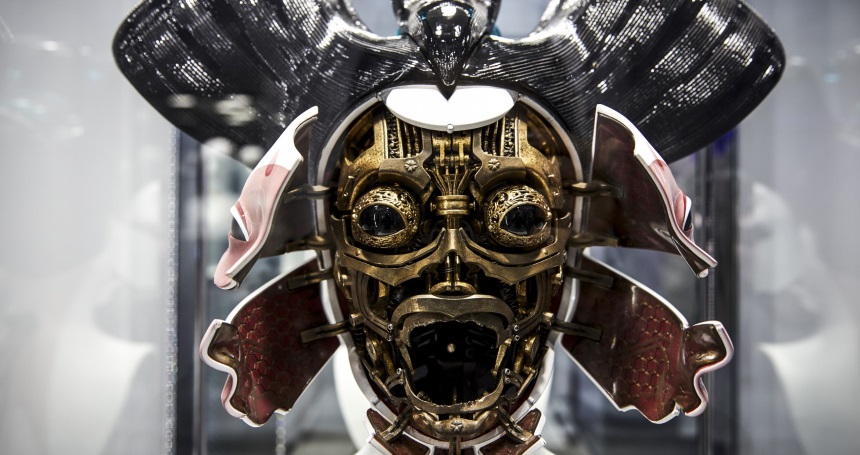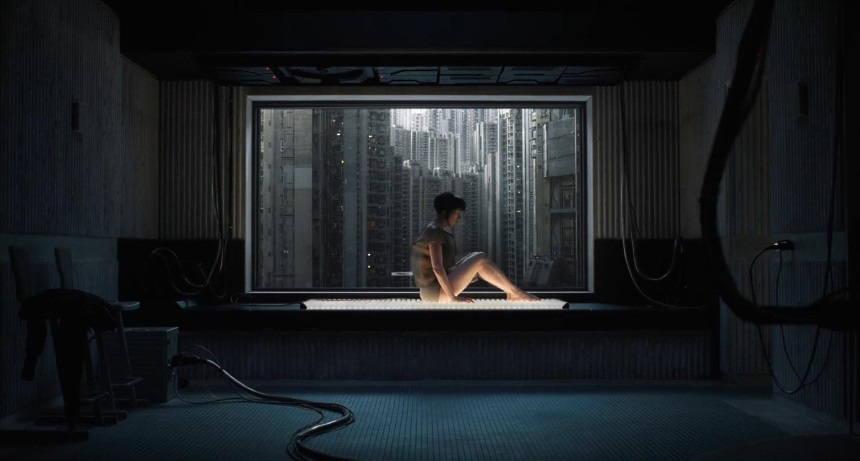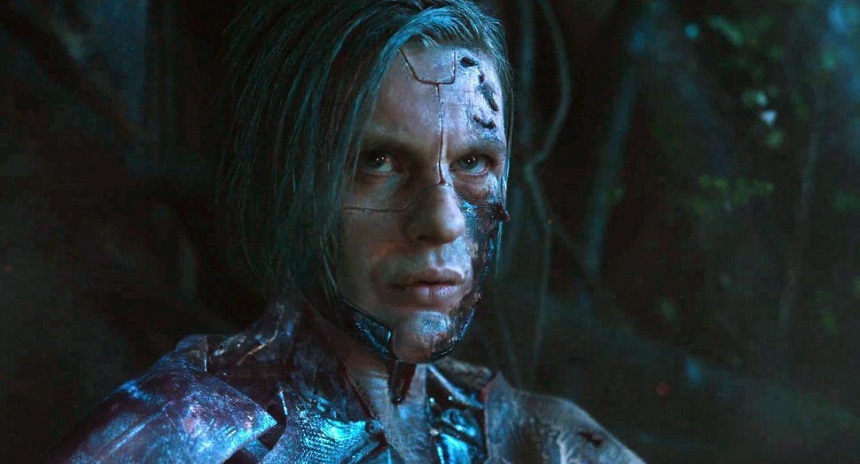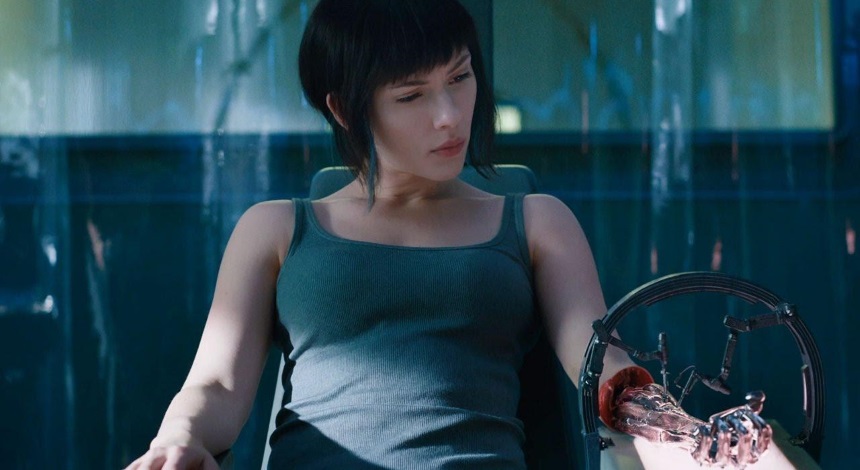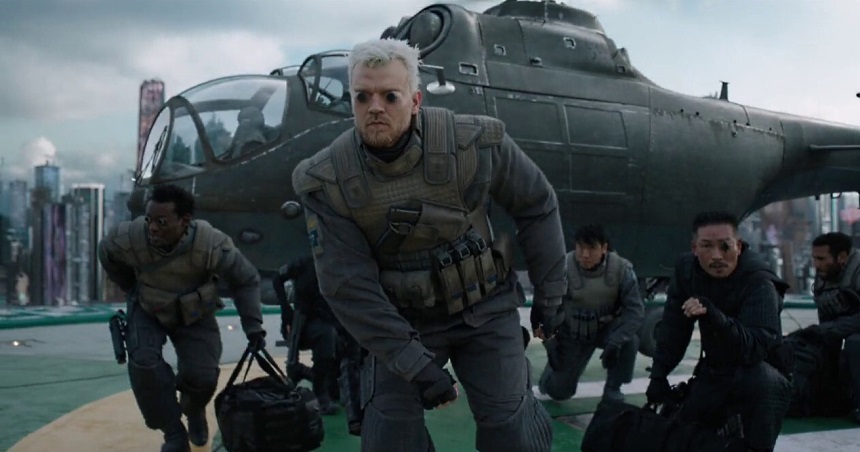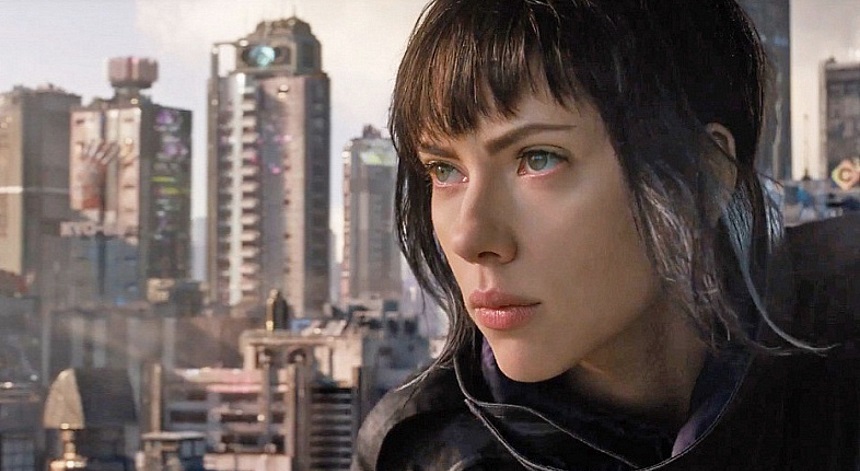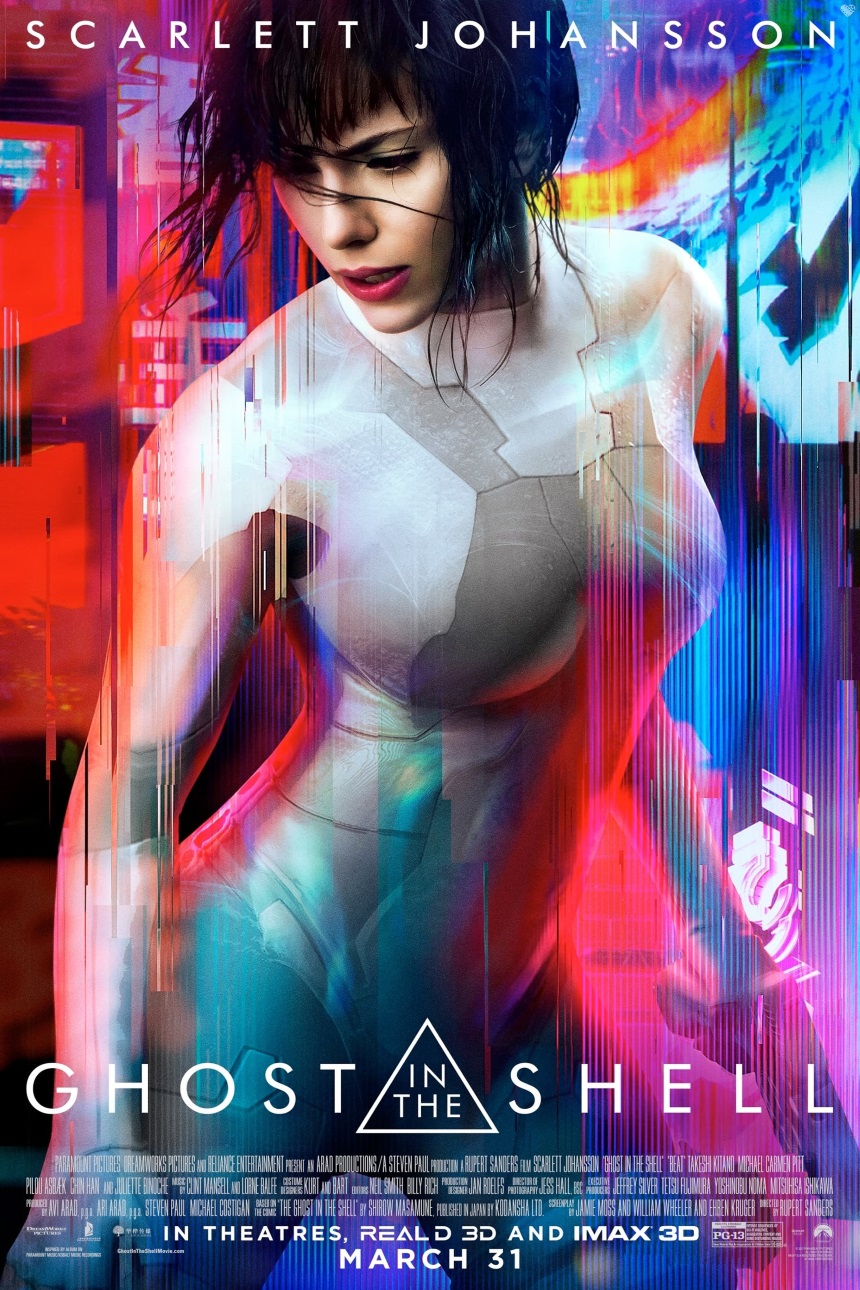Screen Anarchists On: GHOST IN THE SHELL (Live Action)

I don't think we've ever featured a title more fit to be given a group-review than Rupert Sanders' live-action adaptation of Ghost in the Shell. A huge-scale re-imagining of several beloved source materials, the film is literally surrounded by expectations and controversy. The fact that it stars Scarlett Johansson has in itself already been a source of much (dis)content.
Its box office so far is disappointing, culprits are sought, fingers pointed, and opinions differ. So what did we make of it, here at Screen Anarchy? Our Pierce Conran did the official review, and his take was actually a very positive one which you can read here. Others among us were decidedly less friendly towards it. Divisiveness in opinion is awesome, so once again we had a quick round-up of opinions about the film, and have put them up here for all to see, in a gallery.
As usual, we let the writer of the review speak up first, so here is Pierce! But click through them all to see our opinions on the film. Each opinion is valid in its own way, and so is yours, so please leave your own impression in the comments...
Pierce Conran, Kwenton Bellette, Kurt Halfyard, Peter Martin, Stuart Muller and
contributed to this story.








Pierce Conran, Contributor.
Ten days or so after having first seen it, I can’t say that the new Ghost in the Shell has exhibited much staying power. Sanders was perhaps too faithful to the original, albeit more formally than spiritually, resulting in a ravishing update that was all shell and no ghost.
Given the film’s poor start on the charts, many critics have come out once more to deem the film an unnecessary remake and a blatant case of whitewashing. I’m loath to insert myself into those discussions but I personally don’t see a major problem with remakes and I’m don’t really buy into the whitewashing controversy on this one.
Yes, many remakes are cash grabs, but since stories were first shared through spoken word thousands of years ago, storytellers have always sought to tap pre-existing content. It’s the nature of the business, from Disney franchises all the way down to arthouse fare all around the globe. I would prefer if more big-budget remakes were better, but I don’t begrudge studios the right to purchase and adapt content, even something like Ghost in the Shell, which is an obvious candidate for a remake, despite what some may say.
The whitewashing argument is trickier, but given that this a remake of a Japanese title by an American studio for an international market and that the location of the story in both is New Liberty City, a deliberately global sounding metropolis that was based more on Hong Kong than Tokyo, I don’t see why the studio is any way obliged to cast someone of any particular ethnicity. Yes, it’s troubling that the lead of a Hollywood blockbuster is almost always white, but that’s an industry problem, and not one related to cultural appropriation.
Furthermore, the idea that someone ‘Asian’ should have been cast can also be problematic. While I would love to have seen a global Ghost in the Shell with someone like Bae Doona in the lead, that would have quelled whitewashing arguments in the west, but some Japanese fans may not have been wild about seeing someone Korean taking on an originally Japanese role.
Kwenton Bellette, Contributing Writer.
Ghost in the Shell does partial justice to the legendary anime film that is still widely considered a genuine masterpiece. Tonally it is overwhelmingly cyberpunk as the streets of Hong Kong are transformed into a constant transaction, complete with vibrant holographic marketing everywhere. Key scenes are lovingly recreated and some of the characterization feels on point. The shell is very much intact, but the film is sadly lacking a ghost, instead undermining the intense philosophical identity crisis with an emo and po-faced Major, and although the film augments the original story to explain why the Major is white, too much is lost in the adaptation. Ultimately it is nowhere near as offensive as it could have been, and I am keen to catch it again on Japanese blu-ray with the original anime voice cast providing a dub! Rupert Sanders should direct a Deus Ex film, because this honestly felt more in-tune with that franchise than with Mamoru Oshii's opus.
Kurt Halfyard, Contributing Writer.
The most telling line in this Paramount Picture’s Ghost in The Shell is: “Your uniqueness is a virtue. Embrace it, and you will be at peace.” Delivered here by iconic Japanese polymath, ‘Beat’ Takeshi, it is a mission station on how to walk the tightrope of cultural appropriation. What can we read from this line about ‘uniqueness’ in a property that is so very much a copy of a copy of a copy? To that, I quote another line, “We cling to memories as if they define us, but they don’t. What we do is what defines us.”
Cyberpunk has been taking a backseat in cinema for a decade or more. Currently, screenwriters and directors seem more preoccupied with examining only the artificial intelligence component of the genre, over the full noir-ish techno-enhancement freakshow and what that does to a person and the culture.
In a bold stroke, Ghost In The Shell 2017 excises the entire A.I. gambit and the entity know as the Puppet Master who was the instigator in Mamoru Oshii’s animated adaptation of Ghost In The Shell in 1995. There, the A.I. attempts to solidify its ‘genetic longevity’ by merging with an existing cyber-enhanced human, and chief protagonist, The Major.
The mystery elements of the story are retained, the A.I. plot is excised completely. This is key to understanding that the Hollywood remake is a re-envisioning and re-evaluation of its own source material. Yes this version re-stages several key sequences from the original film and punks the goose-bump inducing score over its end credits. (The usually memorable Clint Mansell, is strangely muted with his original compositions.)
It is not perfect, but the current film is actually about something. The writers directly address the complex ‘appropriation’ questions swirling about the film. Even if the raison d’etre in Hollywood is always commercial bank. It addresses the oft-used phrase in remake/reboot/sequel culture of ‘you raped my childhood’ and injects it, not into subtext, but makes it, whole cloth, the text of the story.
SPOILER ALERT The Major is in fact a Japanese girl’s brain shell with a white woman’s visage and silicone body, via expensive corporate funding.
The film’s repeated notion of The Major giving verbal ‘consent’ regarding modifications, upgrades, or operating conditions regarding her body (and mind) is very much a piece of the progressive, social justice, culture that hangs thick and gooey in the virtual air of Twitter. That the large corporation later informs The Major that (like the banal complexity of a software EULA) her acceptance of consent was moot, is a superb encapsulation of the cynical nihilism at the heart of cyberpunk. Identity, culture, and even government is owned by the corporations, and it is up to the individual to do something to define themselves in the ever-fecund Venus Flytrap of technology.
The film’s most coagulated moment is actually a brief face to face between Motoko and her Japanese mother. It is one of the few sequences that slows down enough in its visual splendour – notably taking place in a spartan tiny apartment and its open balcony. One human, one post-human sizing each other up and doing a tentatively intimate, social ritual over the course of a cup of tea. If Sanders has a weakness in his directing is that he doesn’t sprinkle more of this in amongst the ploy for visual and action beats, here is a film that deserves to be longer. And, if I think about it, Mamoru Oshii’s animated version at 1 hour 17 minutes could have used a bit more meat on its cybernetic exoskeleton and a bit less expositional dialogue, I will be the furthest person from calling the original perfect, it benefited largely by mixing a lot of hard sci-fi smarts with studio Production I.G.’s visual panache.
In the end and in the utter absence of A.I. shenanigans, Ghost In The Shell more than anything resembles 1988’s Robocop in story (an unwilling corporate funded cyborg comes to grips with its retained humanity in an effort to control its destiny going forward), and in spectacle - the tank sequence here conjures images as much of the ED209 as it does the original Spider Tank in Oshii’s film.
In adaptation philosophy Rupert Sanders is more akin to Karyn Kusama, and her valiant attempt to sand off some of the sharper edges of Peter Chung’s MTV animated exercise in chaos into a cogent, softer, live action feature. Co-incidentally, they both feature a blonde actress sporting a black wig. And to be clear, I quite like Aeon Flux 2005, and I quite like Ghost In The Shell 2017.
[This is a condensed version of Kurt's full review posted at Rowthree.com .]
Peter Martin, Managing Editor.
On principle, I can never object to big-budget, extravagantly-visualized science fiction. Like the original animated movie, I had trouble following the storyline, but I was caught up in the eye candy and generally enjoyed the experience for what it is: a b-movie writ large and familiar.
Perhaps because of the VFX requirements, Rupert Sanders' action sequences were a touch less frantic and better composed than in the past. Scarlett Johansson brings a degree of welcome pathos to her character.
POSSIBLE SPOILER: Ironic, though, that a real corporation blames its whitewashing on a fictional entity.
Ard Vijn, Associate Editor, Features.
Saying that I'm a fan of Oshii Mamoru's 1995 anime film is a bit of an understatement (I own the film seven times over at the moment). Therefore I was delighted with the glimpses we got of that source material being treated with a surprising amount of respect.
That respect unfortunately never reached the scripting phase of this film though. I don't mind Paramount playing it loose in several areas, in fact Oshii's film itself was interesting because he made many, MANY changes to the world and characters described in Shirow Masamune's books. You might even say that Rupert Sanders' film only comes truly alive during its original content. But oh, how little of that there is...
This new version of the story is itself a Frankensteinian monster, cobbled together with bits and pieces taken from the earlier films and series. Unfortunately, for its skeleton they looked entirely elsewhere: they went with Paul Verhoeven's Robocop, though they first excised all wit and satire from it. The end result is a rather bland and non-sensical run-of-the-mill cyborg story, with what may be the worst realized villain character I've seen in ages.
But I really liked Scarlett Johansson and Pilou Asbæk, and their "friendzone" chemistry was spot-on in my opinion. Their scenes together hint at a much better film which would have focused more on them, and their outlooks on life.
As for the whitewashing controversy: as a white dude, I thought that was side-stepped nicely. These four ladies beg to differ though, and reading their opinion is very much worth your time.
One last comment I have: visually the film is very cool, but so much of it is rooted in science fiction visions of decades ago, that it comes off as retro. Each iteration we've seen so far of Ghost in the Shell has tried to portray the future as truthful as possible, given the technical knowledge at the time. This is actually the first version which feels old-fashioned.
Stuart Muller, Contributing Writer.
I last, and first, saw Ghost in the Shell around 2003. I’ve maintained a strong but vague affection for it based on that experience - I think it was the first “adult” animated feature I’d ever seen, and certainly the headiest. It was mesmerizing. That said, few specifics endured; perhaps it was too cerebral for me at the time, or perhaps the animation and visuals simply overwhelmed my attention, but there was no clear crux of the film’s philosophical rumination.
Not so in this new Ghost in the Shell, which I found more lucid in its musings, and no less mesmerizing. Perhaps this philosophical clarity is just a matter of age and experience, but I think there’s more to it.
In the 1990’s we were just beginning to explore the implications of our newly networked world. Japan has always been in the vanguard of electronic culture, but the film also resonated with western audiences because we were all grappling with the same seismic cultural shift; the redistribution of reality into a new virtual realm of pure shared connection. Can something resembling consciousness emerge from a sufficiently complex network? Do "ghosts" arise from connectivity, or do they reside in humanity? Interesting questions, exquisitely realized in the original film, but fundamentally abstract and intangible. Twenty years later we’re now more connected than was ever imagined, and still no hive mind has materialized (just mob mentality manifest in new mediums).
The central question relating machine and mind is no longer the matter of emergence, one from the other, but rather convergence of the two. Just last week the radio told me about a paralyzed man who, despite the fact of his physical paralysis, was able to move his arm/hand/fingers to feed himself with his mind, plus technology. If we think drugs are a bugbear in professional sport, imagine what the mech-era will unleash.
Ghost in the Shell 2017 tackles the original’s same big questions about mind and machines, but comes at it from a more contemporary - and tangible - direction. Where the original considered the transition from machine to mind, the current film is more interested in the fusion of the two. The original ghost emerged from machine. The new ghost is merged with machine.
I enjoyed the new film so much I went home and watched the original again for the first time in 15 years. It holds up extraordinarily well, and in many cases the sublime animation still surpasses even the best wizardry from Weta (though I don’t think Weta has ever created a more luminous universe). However, I still found the intellectual oomph less penetrating than in the new film. Perhaps the original question just isn't as pressing, though burgeoning AI certainly means its still relevant, whereas the current film’s more direct examination of our humanity, as we stand on the brink of technological human enhancement, is urgent and prescient.
Ultimately, I feel these two versions make for complementary sides to a fascinating philosophical coin. And both sides are beautiful to behold.
Jason Gorber, Featured Critic.
Once again, Jason chimes in by way of television appearance:

More about Ghost In The Shell (Live Action)
More about Have Your Say
Around the Internet
Recent Posts
Leading Voices in Global Cinema
- Peter Martin, Dallas, Texas
- Managing Editor
- Andrew Mack, Toronto, Canada
- Editor, News
- Ard Vijn, Rotterdam, The Netherlands
- Editor, Europe
- Benjamin Umstead, Los Angeles, California
- Editor, U.S.
- J Hurtado, Dallas, Texas
- Editor, U.S.
- James Marsh, Hong Kong, China
- Editor, Asia
- Michele "Izzy" Galgana, New England
- Editor, U.S.
- Ryland Aldrich, Los Angeles, California
- Editor, Festivals
- Shelagh Rowan-Legg
- Editor, Canada


